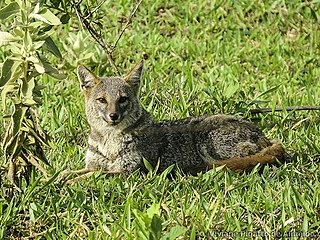
The hoary marmot is a species of marmot that inhabits the mountains of northwest North America. Hoary marmots live near the tree line on slopes with grasses and forbs to eat and rocky areas for cover.

The hoary fox or hoary zorro, also known as raposinha-do-campo in Brazil, is a species of zorro or "false" fox endemic to Brazil. Unlike many other foxes, it feeds primarily on small invertebrates such as insects.

The hoary bat is a species of bat in the vesper bat family, Vespertilionidae. It lives throughout most of North America.

Prosotas nora, the common lineblue, is a species of lycaenid butterfly found in Asia to Australia. The species was first described by Rudolf Felder in 1860.

Prosotas noreia, the white-tipped lineblue, is a species of lycaenid butterfly found in South Asia and Java.

The Hawaiian hoary bat, also known as ʻōpeʻapeʻa, is a species of bat endemic to the islands of Hawaiʻi. Whereas the mainland hoary bat is found throughout North America, the Hawaiian hoary bat is distributed only among the major volcanic islands of Hawaiʻi, making it the only extant and native terrestrial mammal in the state; although some studies also posit that the mainland hoary bat lives in sympatry on the Hawaiian Islands alongside the Hawaiian hoary bat, this has been disputed. The Hawaiian hoary bat was officially named the state land mammal of Hawaiʻi in 2015. It is a federally listed endangered taxon of the United States.

Oligia fasciuncula, the middle-barred minor, is a moth of the family Noctuidae. It is found in Europe.

Apamea zeta is a moth of the family Noctuidae. It has a Holarctic distribution, and can be found throughout the Northern Hemisphere. It occurs throughout Europe and the northern half of North America.
Anarsia acaciae is a moth of the family Gelechiidae. It is found on the Canary Islands, Algeria, Israel and south-western Arabia.
Cathegesis angulifera is a moth in the family Gelechiidae. It was described by Walsingham in 1897. It is found on the West Indies.
Helcystogramma juventellus is a moth in the family Gelechiidae. It was described by Walsingham in 1897. It is found in Jamaica and Mexico (Tabasco).
Faculta synthetica is a moth of the family Gelechiidae. It is found in Mexico (Sonora).
Filatima nigripectus is a moth of the family Gelechiidae. It is found in Mexico (Sonora) and the United States, where it has been recorded from Arizona.
Battaristis symphora is a moth of the family Gelechiidae. It was described by Walsingham in 1911. It is found in Mexico (Tabasco).
Aristotelia crassicornis is a moth of the family Gelechiidae. It was described by Walsingham in 1897. It is found on the Virgin Islands, where it has been recorded from St. Jan.
Ornativalva heligmatodes is a moth of the family Gelechiidae. It was described by Walsingham in 1904. It is found in Algeria and Tunisia.
Isophrictis modesta is a moth of the family Gelechiidae. It was described by Walsingham in 1888. It is found in North America, where it has been recorded from California.
Polyhymno convergens is a moth of the family Gelechiidae. It was described by Walsingham in 1911. It is found in Mexico (Guerrero).
Antaeotricha admixta is a moth in the family Depressariidae. It was described by Lord Walsingham in 1913. It is found in Mexico (Guerrero).
Catarata stenota is a moth in the family Depressariidae. It was described by Walsingham in 1912. It is found in Guatemala.







